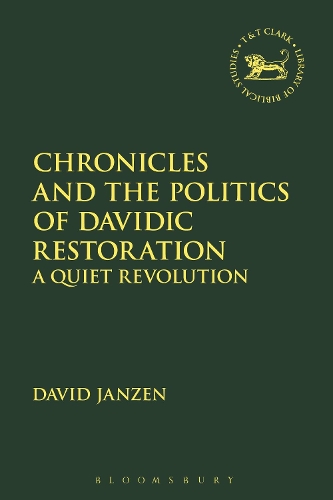
Chronicles and the Politics of Davidic Restoration: A Quiet Revolution
(Paperback)
Available Formats
Publishing Details
Chronicles and the Politics of Davidic Restoration: A Quiet Revolution
By (Author) Dr David Janzen
Bloomsbury Publishing PLC
T.& T.Clark Ltd
29th November 2018
United Kingdom
Classifications
Tertiary Education
Non Fiction
Criticism and exegesis of sacred texts
Old Testaments
222.606
Physical Properties
Paperback
304
Width 156mm, Height 234mm
426g
Description
David Janzen argues that the Book of Chronicles is a document with a political message as well as a theological one and moreover, that the books politics explain its theology. The author of Chronicles was part of a 4th century B.C.E. group within the post-exilic Judean community that hoped to see the Davidides restored to power, and he or she composed this work to promote a restoration of this house to the position of a client monarchy within the Persian Empire. Once this is understood as the political motivation for the works composition, the reasons behind the Chronicler's particular alterations to source material and emphasis of certain issues becomes clear. The doctrine of immediate retribution, the role of all Israel at important junctures in Judahs past, the promotion of Levitical status and authority, the virtual joint reign of David and Solomon, and the decision to begin the narrative with Sauls death can all be explained as ways in which the Chronicler tries to assure the 4th century assembly that a change in local government to Davidic client rule would benefit them. It is not necessary to argue that Chronicles is either pro-Davidic or pro-Levitical; it is both, and the attention Chronicles pays to the Levites is done in the service of winning over a group within the temple personnel to the pro-Davidic cause, just as many of its other features were designed to appeal to other interest groups within the assembly.
Author Bio
David Janzen is Senior Lecturer in Old Testament at Durham University, UK.
